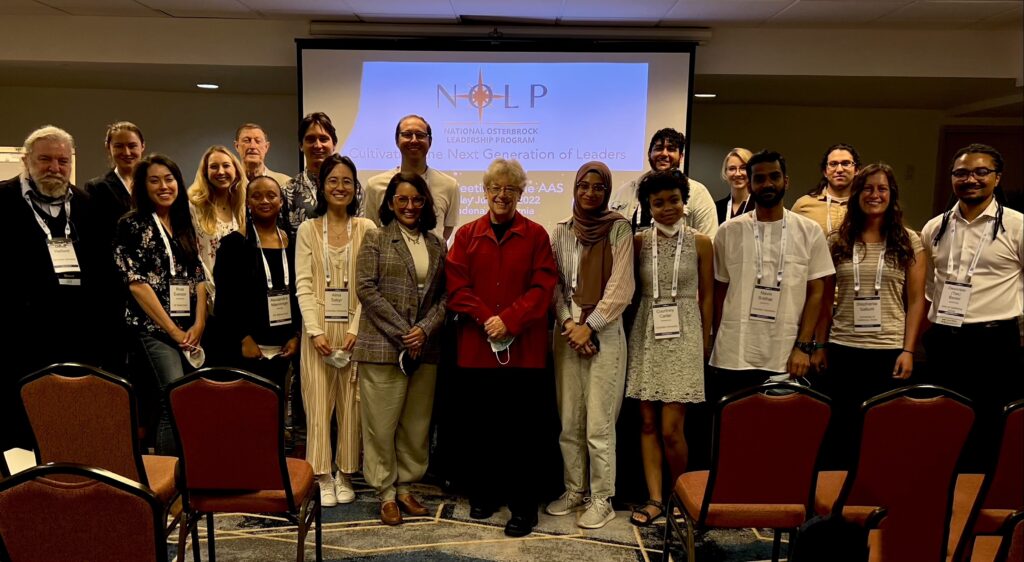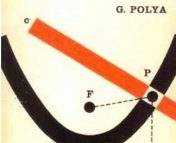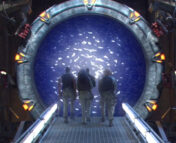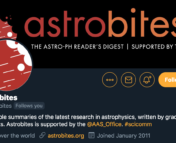tldr: Graduate students from the National Osterbrock Leadership Program are leading a workshop at AAS 241 from 2:00-3:30pm on Tuesday, January 10. At this splinter session, participants will brainstorm and discuss best practices for promoting graduate student leadership in Physics and Astronomy departments. Participants will also consider how to restructure the typical Astronomy PhD program to better prepare grad students for the modern job market. All AAS attendees are welcome to join, regardless of career stage!
The modern Astronomy PhD program is designed to produce excellent researchers: students take courses to build a solid foundation of domain knowledge; they work through the process of inquiry to solve open problems; they present their results via papers and talks; and they produce novel theses to expand the horizons of their field. However, research skills alone are insufficient for the post-PhD job market. Success in both academia and industry requires leadership skills – skills like conflict resolution, team management, budgeting, and communication. Unfortunately, the vast majority of PhD students are not formally taught these skills, leaving grads to acquire these skills on their own, often through trial and error.
The National Osterbrock Leadership Program (NOLP) seeks to remedy this problem of preparedness by incorporating leadership training into the Astronomy PhD. Supported by the AAS and overseen by Robert Williams (of Space Telescope Science Institute), Sandra Faber (of UC Santa Cruz), and David Helfand (of Columbia University), NOLP provides Astronomy graduate students the opportunity to receive mentorship from experienced leaders and to spearhead their own initiatives at their home institutions. By providing the necessary resources and support structures for grad students to exercise their autonomy, NOLP helps these students develop practical leadership skills, bridging the gap between what grad students need to know for their career success and what they are typically taught.
Currently, AAS helps fund three NOLP “nodes” – at Columbia University, UC Irvine, and UC Santa Cruz – with five to ten graduate student fellows at each node. While there are a handful of cross-node activities, like attending AAS meetings, sitting in on telescope time allocation committees (TACs), and participating in congressional visit days, each node operates largely independently, each leading their own initiatives. At Columbia, each NOLP fellow is implementing their own community service project; current projects involve starting an Astronomy outreach program at a local cancer hospital, developing a computer science summer program for underprivileged youth, and launching an interdisciplinary seminar series for all Columbia STEM grad students. Additionally, the Columbia fellows have met with leadership experts from the Columbia Business School, the UN, Wall Street, and beyond. At UC Irvine, the fellows maintain the Physics & Astronomy Community Excellence (PACE) program, a graduate student-led peer mentoring organization. At UC Santa Cruz, the fellows run the “mini-grants” program, which gives each grad student in the UCSC Astronomy department the opportunity to propose and implement (with department funding) their own academic or service project.

Despite there only being three NOLP nodes (at present), any Physics or Astronomy department would benefit from implementing a similar leadership training program. To facilitate this, the NOLP fellows are leading a workshop at AAS 241 to discuss the value of graduate leadership programs and the optimal means of developing and sustaining such programs; workshop participants will brainstorm strategies for not only expanding support structures in departments where such structures already exist, but also for building these structures in departments where they’re absent. This splinter session is open to anyone, regardless of career stage – contributions from grad students, postdocs, and faculty are all valuable. After the session, the NOLP fellows will draw on salient points from the discussion to compile a playbook of best practices for graduate student leadership; this document will be made available via the AAS and should be a beneficial resource for any student motivated to lead a new project or initiative in their department.
The utility of leadership training extends far beyond academia, and with more and more Astronomy PhDs looking to become leaders in industry and the private sector, programs like NOLP are of ever-increasing importance. To address the demands of the present-day job market, a systematic rethinking of the goals of the modern Astronomy PhD program is in order. The National Osterbrock Leadership Program invites everyone, nationwide, to participate in this conversation.
Astrobite edited by: Maryum Sayeed + The NOLP Fellows
Featured image credit: UC Santa Cruz Osterbrock Fellows




